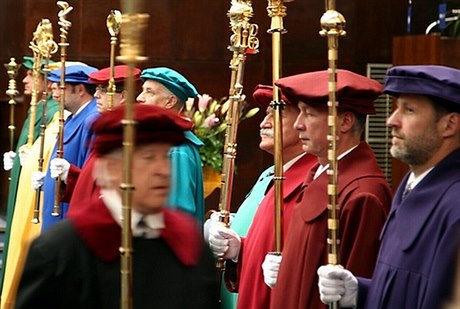When there is one teacher for up to 40 students at Czech universities, it is hard to produce another renowned scientist like Otto Wichterle, Jaroslav Heyrovský or Antonín Holý. Even though it’s theoretically possible now, the education system could be improved to make it more likely. One plan under way involves dividing higher education facilities into those that concentrate on global research by training scientists, and those that deal with regional education by producing specialists with bachelor’s degrees for local factories.
A classification of the country’s universities under preparation by the Ministry of Education (MŠMT) should contribute to better targeting of financial resources. According to information at Czech Position’s disposal, this process will appraise schools in 15 interlinked indicators in several main groups.
Although Prime Minister Petr Nečas (Civic Democrats, ODS) has mentioned the possibility of five or six research universities in the Czech Republic, the MŠMT does not want to arbitrarily and opaquely decide which schools would fall into this attractive category.
“The system should be open. We will not determine categories in an a priori manner for designating schools or faculties,” Jan Koucký, deputy education minister for universities, told Czech Position. “We have to specify appropriate criteria and good indicators, which will tell us what sort of school it actually is in various respects, i.e. whether it concentrates on regional or global objectives, or whether it is geared toward science or just focuses on learning.”
Koucký’s team is supposed to prepare a new Universities Act and separate universities according to their specialization. Schools will also be financed according to this.
Main groups of criteria
Performance in science: This will not only be measured in the MŠMT’s research and development registry (RIV) databases according to individual disciplines, but also according to how many times their work has been cited in international journals. It will be based on the Scopus database and the SciMago project, which has included 17 Czech bodies among the 3,000 best performing institutions — the Academy of Sciences of the Czech Republic (AV ČR), the Institute for Clinical and Experimental Medicine (IKEM) and 15 universities.
Evaluation of results being put into practice: Technical schools are clamoring for this; a calculation is made of how much money schools get from private sources. “Not only will we be rewarding them for this, but it will also give them an incentive to conclude more contracts with the business sector,” Koucký said.
Employability and use of graduates on the labor market: This can help slightly neglected schools in regional areas, which employers have to rely on nonetheless.
Internationalization of the school: This comprises a large package of criteria, which not only includes students’ international trips, but also covers cooperation between the school’s workers and colleagues abroad.
Proportion of professors and associate professors: Conversely, the importance of these criteria will fall. “Generally, we are striving to base everything on indicators that point to a school’s results, but schools cannot speculatively influence these,” said Koucký. The deputy minister has succeeded in appeasing rectors who did not see eye to eye with his predecessor, Kryštof Hajn.
Participation of bachelor’s degree holders in practical experience and mobility between schools: This should support greater mobility within the framework of the Bologna Process (the creation of a European Higher Education Area that is intended to make degrees and standards comparable across the EU). It would therefore be more common for a bachelor’s degree holder to graduate in Pardubice, for example, and go on to complete a master’s degree in Ostrava and to finally a doctorate at Prague’s Carolinum.
Not just units, but also research faculties
According to Koucký, entire schools need not be categorized as a whole, but just smaller units, i.e. faculties and institutes. Even an institution like Charles University has considerable disproportions in research, e.g. it is hard to compare three theological faculties with the Faculty of Mathematics and Physics. Regardless of whether it will be five schools or 15 different faculties, the Education Ministry will approach selected research centers differently, particularly in regard to funding. “The key thing here is the fact that nobody wants to say — and nobody may say — that research schools are somehow better than others,” Petr Fiala, the president of the Czech Rectors Conference, told Czech Position.
Rectors have already received material to comment on, so that schools can enroll students according to the new rules as early as this year and be funded according to their classification as of 2012.
“We are now looking for criteria that we can use to help us in assessing schools in various areas,” Koucký said. “And we will verify the indicators that we already have or that we create, which will be gradually integrated into the funding system. It makes a lot of sense if it’s interconnected: We will be clearly telling schools to choose which role they want — global research or regional learning. We will then assess them according to the results that they achieve in these areas.”
As early as next year, 70 percent of resources are supposed to be allocated to schools according to the number of students and 30 percent according to quality. This year, only 10 percent will be allocated on the basis of quality. There is a “5-percent rule” in place as a safety valve for the transition period, i.e. no school will receive more than 5 percent less compared to the previous year as a result of a change in the rules from one year to the next.
Rectors: Comprehensive criteria are necessary
Rectors are generally in favor of the categorization plans. “Naturally, classification must occur on the basis of objective criteria and results, not who is better or worse, but what is appropriate for this school and where it will be categorized,” Václav Havlíček, the rector of the Czech Technical University (ČVUT), told Czech Position. His institution has hopes of becoming a research university.
According to Ivo Vondrák, the rector of the VŠB-Technical University of Ostrava, the “appraisal of a school’s academic performance” is important, but so is “acknowledging cooperation with practical experience through which our university obtains Kč 125 million thanks to contractual research.” VŠB-Technical University of Ostrava intends to merge with the University of Ostrava.
He claims that geographical factors should also be taken into account so schools also develop in the regions. “It cannot simply be about scientometric data, but about more comprehensive criteria,” he said.
According to Karel Rais, rector of the Brno University of Technology (VUT-Brno), the research performance of a school must be evaluated. He also emphasizes integrating the volume of funds from research contracts with corporations as well as carefully monitoring how well graduates fare. “In any event, it must be a multicriterion evaluation,” he said.
The current system no longer works
Koucký said there will certainly be several criteria, so that schools themselves can ascertain what they are capable of. Then some sort of “self-reduction” of university institutions is both possible and logical so that genuinely top-class parameters can be accomplished, regardless of whether it concerns research or preparing specialists for practical experience.
No other option exists apart from the rapid categorization of tertiary education, according to Koucký. This is also true because 20 years ago, only the cleverest 15 percent studied at universities while today more than half the population is attending them. “This system is no longer able to fulfill its original function because it comprises a massive body of students with absolutely different assumptions, motivations, interests and aspirations,” Koucký concluded.





